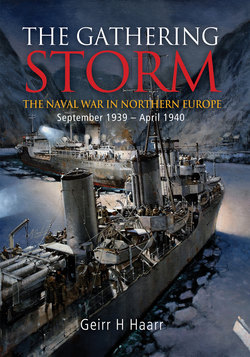Читать книгу The Gathering Storm - Geirr Haarr - Страница 10
На сайте Литреса книга снята с продажи.
Оглавление— 1 —
Introduction
THERE WAS NO ‘PHONEY war’ at sea at the start of WWII. The hostilities commenced literally within the hour of war being declared. This book describes those early events at sea as they are remembered through the accounts of those that were actually there.
The accounts of the men who went to war is challenging material. Inevitably written sometime after the events, hours, days or years, room is made for the individual or his superiors to add, interpret or omit events. Many of the documents contain corrections or comments that could have been made by the author, his superiors, staff members or readers, not always obviously distinguishable from the first-hand accounts.
Most individuals saw little beyond their own decks and had limited knowledge of what was actually happening. Quite often, accounts from different persons present at the same event describe quite different experiences, giving contradictory information, resulting in more questions than answers. The confusion of combat and lost sense of time often resulted in accounts from otherwise level-headed individuals that, when compared to others also at the scene, gives an interesting insight into the nature of war itself. There are also direct errors in some of the reports, typically in names of persons, places or ships, but also in relative position and results of their own fire. In a few cases, there are also what appear to be deliberate over-statements or manipulations, probably intended to increase the apparent importance of the effort of the author or his comrades.
Nevertheless, I have found scores of individual stories from which, together with the formal reports and memoirs, paints a picture of the war at sea in the first seven months of the war. There is lots of tedium, routines and boredom, but also heroism, self-sacrifice and fear. Both sides faced ‘the cruel sea’. The winter of 1939–40 was appalling and, often, the ocean was a worse enemy than the men from the other side.
The research material has come in many languages: English, German, Norwegian, Swedish, Danish, Polish and French. All translations into English are my own responsibility and, where necessary, I have striven to maintain the significance of what was said or written rather than give a word-for-word translation. For documents written in English, the quotations have been kept as much as possible as the original, except for a few minor changes to improve the readability. The account is mainly based on primary sources, where possible combining official and private material to achieve the best insight. In some cases, secondary sources have been used after a thorough assessment of their credibility.
In compiling the manuscript, I have attempted to make a balanced account from each side, each theatre of war and each type of ship involved. The amount of detail available makes it impossible to cover everything, and faults, mistakes or misinterpretations are inevitable. Hence, anyone who has corrections, comments or alternative information that might lead to modifications or improvement of the account is encouraged to contact me, either directly or through the publisher.
